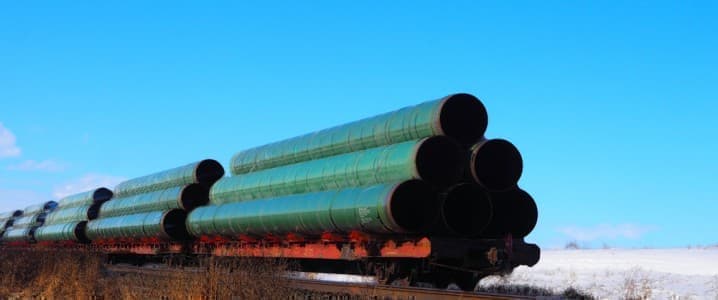With countries around the world experiencing increasing energy insecurity following the Russian invasion of Ukraine, many are looking for ways to increase their oil and gas supply. Rising prices and severe shortages have demonstrated how reliant the world is on Russian oil and gas. But some are saying that regions such as Africa, North America, and South America have the potential to significantly boost their supplies to bridge this gap. This has led politicians and citizens across Canada and the U.S. to question the possibility of revisiting the construction of the Keystone pipeline, which could help transport vast amounts of oil across North America. The Keystone XL pipeline extension was proposed by TC Energy in 2008 to transport 830,000 bpd of Alberta tar sands oil to refineries on the Gulf Coast of Texas. Oil sands are considered one the dirtiest forms of crude. It is extremely viscous and requires a high level of refining to convert it into fuel.
The approval of the pipeline extension would suggest that the North American oil industry is likely to thrive for decades to come, due to the significant investment in the transportation line. However, U.S. presidents have gone back and forth on the plan, with the Obama administration vetoing the proposal, and then President Trump bringing it back to the table. Finally, President Biden denied the permit required for the project to go ahead on his first day in office, and the development was officially canceled in June 2021.
But now, with major oil shortages being felt worldwide, many are discussing the possibility of bringing the project back to life. While this would have severe environmental implications, it could help provide North America with the crude it needs during a time of soaring prices and energy insecurity.
For some, they say it’s still not too late to revisit Keystone XL. Concerns around Keystone XL were mainly focused on what an investment in the extension would represent – essentially the longevity of the oil industry. However, if Keystone was approved, the enhanced capacity could help deliver greater levels of oil to North America. This does not necessarily equate to a boost in oil production. This, some experts argue, is the reason why Keystone XL should have been – and still should be – approved.
With TC Energy willing to pump private funds into the project, a movement away from fossil fuels, which could make the pipeline eventually redundant, would not have a negative impact on public funds. Although, this does not consider land use. However, if Keystone XL was deemed necessary, it would provide the U.S. with a close ally to import oil from, moving away from dependence on countries such as Russia, Venezuela, and Iran.
Related: Oil Prices Rebound Despite Biden's Best Efforts
Now, lawmakers in the U.S. are encouraging Biden to reconsider the cancellation of the project. In fact, Montana’s U.S. Sen. Steve Daines called on Biden for the immediate restart of the project. He stated, in February, “President Biden set us on a dangerous path when he decided to kill the Keystone XL pipeline on Day One in office. What’s happening in Russia and Europe is a stark reminder of the need to support American energy development, not hinder it. Energy security is national security, and a global energy-dominant America is a safer world. Biden must restart the Keystone XL pipeline now.”
A recent poll also suggested that U.S. citizens are increasingly in favor of the Keystone XL development, following recent world events. With Canada saying it has the potential to meet the oil demand as global supplies become less certain, many Americans are looking to their friendly neighbor for help during this worrying time.
However, others are not so sure, saying the pipeline won’t achieve what we want it to achieve right now. Although the pipeline could be built by the beginning of 2023 if Biden were to reverse his decision, according to Alberta Premier Jason Kenney, the White House does not believe this would help drive down crude oil and petrol prices.
National Economic Council Director Brian Deese echoed previous concerns around the development, "Any action on Keystone wouldn't actually increase supply, and it would transmit oil years in the future." And "What we're focused on right now is what we can do right now, and ... there are wells that are shut-in and that can be brought back online over the course of the next couple months. What we need right now is to address the immediate supply disruption," he added.
This reiterates the idea that building the pipeline does not equate to higher production, it simply means easier transportation. However, critics argue, that the environmental cost is simply too high. In addition, the investment of billions of dollars in the extension suggests to the public, and oil companies, that the U.S. will continue to support fossil fuels for years to come.
While reversing the Keystone XL decision seems like an obvious move to increase the crude transport capacity between Canada and the rest of North America, viewing it this way is rather too simplistic. As Biden faces the challenge of rising energy insecurity, he is not opposed to increasing production levels but believes this can be done at a faster rate by bringing existing wells back online and moving forward with already approved projects across the U.S.
By Felicity Bradstock for Oilprice.com
More Top Reads From Oilprice.com:
- Why Renewables Can’t Solve Europe's Energy Crisis
- Saudi Arabia Raises Oil Prices To Record Premiums
- Will Biden’s Oil Release Bring Down Prices At The Pump?


















